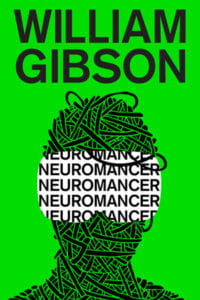Hard-Wired Traumas: A Retrospective of “Neuromancer”

By Thomas Lynch
Look, I’m not here to evangelize about some sci-fi book written in 1984 because it “predicted Trump” or something asinine like that. There’s a misguided tendency to review science-fiction purely based on its novelty when it is new and its prescience when it is old, and books like “Neuromancer,” which flirt with the literary, suffer as a result. Don’t worry, I’ll still be talking about “what it got right”—but it would be a disservice to “Neuromancer” to peg it as merely the novel which predicted what the globalized internet might look like. It’s a good novel, whether it invented the cyberpunk genre or not, and you should read it because it offers some valuable psychological insight into what the globalized internet might do to us as people.
“Neuromancer” is ostensibly the story of Henry Dorsett Case, a young ex-corporate hacker and child soldier of sorts who’s been tricked into a classic one-last-heist situation after a horrific downward spiral in life. Case is a typical character of eighties sci-fi: he’s white, he’s straight, he’s gruff, he’s on drugs, and he even has an Asian girlfriend. Not only did Gibson invent cyberpunk, he may also have invented literary weeabooism. Jokes aside, Case is a great case study precisely for these reasons, pun intended. Case, by virtue of his time and class, has become a murderous wreck of a young man suffering from an intense death-drive and a lack of any meaningful identity in a world over-saturated by it. It’s brilliant; by examining the traditional masculine figure in all his vigor, violence, and general droogery, Gibson gracefully frames arguments against globalization in early sci-fi classics as patriarchal and outdated in order to pose his own, more nuanced critiques.
Speaking to that is the fact that no one else in the diverse cast seems to be doing much better. Linda Lee (that Asian girlfriend) is a dope-fiend born and trapped in the neocolonial dregs of Asia. Case’s co-conspirator, Molly Millions, is a sad shell of a human who has (literally) weaponized her femininity to the point of losing all agency, acting against her own traumatized muscle-memory in order to fulfill the role of femme fatale. Yet another one of Case’s co-conspirators, Jake Riviera, is a disturbed socialite serial-killer with a penchant for cyborg augmentation bordering on body-horror and Middle-Eastern “advisory” work. And above them all looms the shadow of their patron, Armitage, a mysterious ex-military figure with latent schizophrenia and unresolved PTSD from a much bloodier Cold War than our own.
This characterological digression is where I think my review of “Neuromancer” begins to differ from what’s generally out there. The biggest thing to talk about here isn’t the internet, especially when such vibrant, tragic characters are present, too. As a matter of fact, more than anything about “onlineness” or “cybernetic dystopia,” I’d argue that Neuromancer is about its characters’ traumas, infinite, unbounded traumas that stretch across pages and firewalls and oh-so-many parts of the elaborately failing heist. Naturally, this theme intersects with questions of speculative technology and identity inherent to speculative fiction; however, it’s not these elements that affect readers most. It’s the fine attention to all of these characters and many others as they slowly lose their sense of identity and self-control and begin killing, killing, killing. Technology often presents itself as an intermediary in this breakdown, yes, but it quickly goes from augment to aid to addiction regardless of who you are. And—like all other addictions—it ends in the completely and utterly gutting of this identity. The future may hold limitless technological potential for us to customize and micro-tune our globalized identities, Gibson argues, but none of it matters if the human condition doesn’t change. And that’s the beauty of this book. It may be wonderfully inventive and darkly clever in all those fun science-fiction-y ways that we like to advertise, but it’s also a deeply humanist novel that will make you feel things about yourself. Maybe about other people, too. Maybe, dare I say, about our Society™.
Oh, and one final word of warning. The first act hasn’t aged the best. Barring the immediate issue of its Japanophile aesthetics—being a weeb in the current year is a death-knell—it’s a rather long, solipsistic look at the psyche of a disillusioned, subconsciously-suicidal, drug-addicted white male. I hate to play that identity card here, but frankly, it’s been done better before and current-day readers are quick to dismiss novels on that merit alone. I just want to caution against being too dismissive. Gibson isn’t exactly progressive; nor is he a champion of women’s rights (at the least, he’s certainly no Atwood with his speculations). But his unique breed of cynicism towards “egalitarian” global capitalism provides a much more useful frame of critique. If there’s anything that Gibson “predicted,” it’s this: the modern conception of identity is based on consumption. And regardless of who you are (or who you claim to be), consumption eventually subsumes our identities and leaves us with nothing but trauma, violence, and the feelings of isolation that fuel both.
Thomas Jiwon Lynch is a junior studying English literature with a focus on creative writing. He writes poetry, and is currently working on his second collection. In his free time, he enjoys line editing and making bad content in Microsoft Paint as well as the blog MSPaintHelp.com. You can find him online on most platforms at @jiwonlynch.

